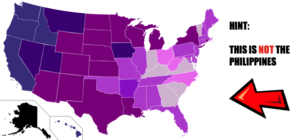In this day of the hyperconnected media – when cable networks routinely tout various programs appearing in the Philippines “on the same day as the US” – it can be quite surprising that some people still don’t fully understand how it is possible for the US to “proclaim” Presidents-elect mere hours after elections; even more jarring is the apparent lack of comprehension about how things work here at home.
Case in point: Mansanas, sa COMELEC Unang Kinagat.
“Labing walong oras (18 hours) makaraang magbukas ang unang voting precinct sa AUTOMATED ELECTIONS sa US, alam na kung sino ang panalong pangulo. Sa kabilang dako, inabot ng Labing Walong araw (18 days) ang nakalipas bago nagkaalaman kung sino ang nanalong pangulo nitong nakalipas na halalan sa PH (Eighteen hours after the opening of the first voting precinct in the AUTOMATED ELECTIONS in the US, the winner of the Presidential elections were known. On the other hand, it took eighteen days before the winner was known in the last Presidential elections in the Philippines). “
[Deleted expletive]No Prematurity
First, the Omnibus Election Code, Batas Pamabansa Blg 881, prohibits premature announcements of the state of the polls:
Section 205. Prohibition of premature announcement of voting. – No member of the board of election inspectors shall, before the termination of the voting, make any announcement as to whether a certain registered voter has already voted or not, as to how many have already voted or how many so far have failed to vote, or any other fact tending to show or showing the state of the polls, nor shall he make any statement at any time, except as witness before a court, as to how any person voted.
This means that until the polls have closed, the Board of Election Inspectors cannot even hint at the turn-out, let alone the over-all results for national offices, such as the Presidency. In any case Philippine electoral laws, with or without automation, vest the power to proclaim Presidential and Vice-Presidential winners exclusively in Congress. The BEI and even the COMELEC are absolutely not empowered to do that.
And even when it’s Congress doing the announcement, BP881 Section 20 explicitly provides: “Proclamation shall be made only upon submission of all certificates of canvass or when the missing certificates of canvass will not affect the results of the election.”
In the US, things are different. As Quartz reports, citing the New York Times:
“Most major news networks rely on the same basic voting data to make calls and projections state-by-state. The patterns in that data may suggest clear winners long before all the votes have been counted.
“The Associated Press and the US’s five major news networks—ABC, CBS, CNN, Fox, and NBC—are all members of a consortium called the National Election Pool, which has provided election night information including the vote count, analysis, and projections since 2003.
“These networks use what are called “decision desks,” which employ dozens of statisticians and pollsters to project winners based on their analyses and the new organizations’ proprietary statistical models, according to the New York Times.”
Put more simply, the US news networks project the winners even before the counts are actually completed. In other words, when CNN says Trump is the new president, it is a prediction, not an official proclamation. In the Philippines, however, when Congress said Duterte was the new president, that was no prediction; that was as official as it could get.
Concessions
The one thing that gives news network projections such a patina of legitimacy in the US, is the fact that the candidates themselves accept the validity of those projections and act accordingly. In 2016, based simply on projections – and NOT the official count – Clinton conceded the elections to Trump. The same thing happened in 2004, in Bush v. Gore. The difference between 2004 and 2016 was that in 2004, Gore actually retracted his concession.
The retraction of concessions, while uncommon, are not unheard of. They are certainly not illegal. This is because the concession isn’t based on law so much as it is based on sportsmanship and a dedication to the idea that candidates ought to put the needs of a unified democratic country ahead of their own personal desires. As a rule of thumb, it is better for a candidate to mistakenly accept a loss than to subject the country to the instability caused by a long-drawn out battle over who actually won.
Apparently, we don’t believe in that sort of nonsense over here.
Nonsense
What some of us clearly do believe in is the validity of comparisons between the performance of two wildly varying electoral systems, existing under ridiculously different socio-political environments, involving politicians who emerge from political traditions that bear precious little resemblance to each other.
Bravo.

